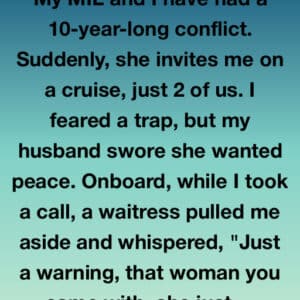I booked the window and aisle for a flight with my mom, hoping the middle would stay empty. If someone landed there, I’d offer them our aisle or window. Easy plan.
We board, and there’s a woman already in my aisle seat—AirPods in, eyes shut like she owns row 18. Whatever. I slide into the middle so my mom can keep the window.
Five minutes later, a guy shows up and stops short. “I think that’s my seat you’re in.”
She blinks like she’s waking from a coma. “Oh, I thought it was open seating.”
“It’s not. That’s 18C, and it’s mine.” Polite, firm.
She looks at me, waiting for me to bail her out. I don’t. I’m already in the middle for my mom. I’m not hosting musical chairs for someone who can’t be bothered to ask.
She sighs like she’s the injured party and stands. The guy slides in, gives me a small smile. “Thanks for not making it weird.”
“Travel brings out the best in everyone,” I say, and he laughs.
She takes a seat one row behind us and doesn’t say another word—just the occasional glare like she’s practicing laser vision. I tune her out and settle into the quiet hum of the flight.
Midway through, the guy pulls out a paperback: Learning to Let Go. Curiosity wins. “Any good?”
He glances over. “Yeah. Helped more than I expected. Lost my wife last year. Still figuring out how to move forward.”
The cabin air thins. “I’m so sorry,” I say.
“Thanks.” He looks at the seatback for a long second. “We used to travel all the time. Feels different now.”
My mom, half dozing, touches his arm. “She must’ve been special.”
“She was.” His eyes shine. “Rosa. She made everyone feel like they mattered.”
We sit in a full, gentle silence.
“First trip since she passed?” I ask.
“Second. First one I canceled at the gate. This one, I promised myself I’d try.”
“You’re brave,” my mom tells him.
He huffs a laugh. “I’m just trying not to stay stuck.”
We don’t talk much after that, but the rest of the flight feels companionable, like we’re sharing a row with something bigger than turbulence.
When we land, I help my mom with her bag. He smiles. “Thanks for the chat. It helped.”
“Anytime.”
As we wait to deplane, a loud sigh erupts behind us. “People should really sit where they’re assigned.” It’s the squatter. She adds, just loud enough, “I was hoping to avoid sitting next to him.”
I can’t tell who she means. Either way, it curdles.
Outside the gate, we run into him again. He’s looking around like the terminal moved overnight. “Need help finding baggage claim?” I ask.
He chuckles. “Apparently I forgot how airports work.”
We walk together until our paths split. Before we part, he pulls the book from his bag and hands it to me. “Here.”
“I can’t take this.”
“You listened. That’s more than most people do. I have another copy at home.”
It’s heavier than it looks.
Two days later, I’m in line at a coffee shop when I spot her—the aisle-seat bandit—arguing with the barista. “I said oat milk, not almond! Is it that hard?!”
The barista apologizes and offers to remake it. She keeps snapping, volume up for the room.
I try to let it go, but the contrast hits me: a man shouldering grief with grace versus someone melting down over milk.
She catches me looking. “What? Do I have something on my face?”
“Just the same expression you wore when you took my seat on the plane,” I say before I can stop myself.
Her mouth opens, closes.
“You never asked. You never said thank you. And now you’re yelling about oat milk?” My voice carries. The café quiets.
“You don’t know me.”
“You’re right,” I say. “But I sat next to a man who lost his wife and still managed to be kind. That told me a lot more than this.”
I walk away shaking, not because I won but because it needed saying.
Later that week, I crack open the book. In chapter one, the author writes about loving deeply, losing painfully, and choosing grace anyway. The details line up. The name Rosa shows up again and again. The author’s under a pseudonym, but it’s him. Of course it is.
I flip to the acknowledgments. One line stops me: “To the stranger who listens when they don’t have to—thank you.”
I write an online review—about the flight, about the book, about how sometimes the seat you didn’t choose becomes the one you needed most. It blows up. People share their own “middle seat moments,” stories of strangers who nudged their lives back into place.
A week later, an email lands in my inbox.
Subject: You found me.
“I saw the post. I cried. I didn’t think anyone would read that book. I didn’t think anyone should care. But you did.”
We trade messages. He’s thinking of starting a support group for people who’ve lost someone. He isn’t sure he can lead it.
“You already are,” I write back.
He asks if I’ll speak at the first meeting. “About the plane?”
I say yes.
Months pass. I keep reading. I show up. I meet people with lives cracked wide open who are stitching themselves back together with small kindnesses.
After one session, a woman approaches me. “I think I owe you an apology.”
It’s her—the seat-taker, the café-yeller. But softer now.
“I read the post. I read the book. I didn’t like what I saw in myself.” She looks at the floor. “My dad died last year. I never cried. I just… snapped at the world. I started coming here last month. Haven’t missed a meeting.”
“That’s good,” I say, and mean it.
“Thanks for calling me out,” she says. “And for being kind anyway.”
“We’re all figuring it out,” I tell her.
She smiles. “Middle seat karma, huh?”
A year later, the book is dog-eared and underlined to pieces. I’ve given copies to friends. I even dropped one off for that barista with a note: You deserve kindness too.
I used to think the worst seat on a plane was the middle—cramped, awkward, stuck between lives that aren’t yours. Now I know better. Sometimes the middle is where healing starts. Where stories trade hands. Where people remember how to listen.
And sometimes, the person who took your seat is just someone who hasn’t found theirs yet.
If you feel wedged between what was and what’s next, you’re not alone. Someone’s probably right beside you, ready to remind you the world is still gentler than it looks—no matter the seat.





